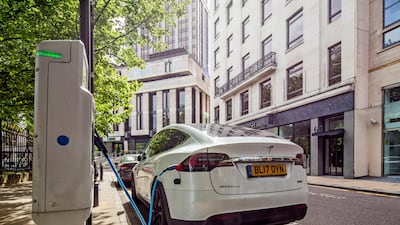Global battery demand is expected to surge by 2030, fuelled by the increase in the number of electric vehicles as the world focuses on cutting emissions to reduce global warming.
Demand for batteries will reach nine terawatt hours (TWh) annually by 2030, 15 times the levels recorded in 2020, according to a new report from Oslo-based Rystad Energy.
The projection comes on the back of increased demand for EVs, as corporations and individuals try to adopt sustainable practices to mitigate the effects of global warming.
“Passenger electric vehicles will be the most significant contributor to future battery growth, accounting for about 55 per cent of total demand by the end of the decade,” Rystad said.
“Demand for these batteries is expected to hit 4.9 TWh by 2030, more than 13 times higher than 2021’s comparatively tiny total of 373 GWh.”
Stationary storage will be the next most significant contributor, with a projected demand of more than 2.5 TWh in 2030, accounting for 29 per cent of the total market. The need for storage is expected to soar from 139 GWh in 2021 because of the "more prominent role that volatile renewable energy sources will play as the world shifts away from fossil fuels". Electricity will need to be stored when renewable power output is high, to support the periods when output falls, such as times when wind speeds are low.
In terms of components, lithium-ion batteries will dominate the market this decade, although sodium-ion battery demand will materialise by 2030, the report said.
Global sales of EVs more than doubled to 6.6 million in 2021, as people opted for eco-friendly alternatives to traditional fuel guzzlers.
Worldwide EV sales currently enjoy a market share of 9 per cent in the overall car industry, more than double the 4.1 per cent share in 2020 when three million units were sold, and more than triple 2019's 2.5 per cent share, when 2.2 million cars were sold, according to an International Energy Agency report.

Asia, specifically China, will dominate battery demand growth by 2030, Rystad said. Asian demand will account for 41 per cent of the global battery market, reaching 3.6 TWh.
European and North American battery demand is also expected to steadily increase by the end of this decade, reaching 1.9 TWh and 1.7 TWh respectively.
Demand from Africa is projected to increase gradually over the next few years, after which it will surge more than 350 per cent to 227 GWh in 2030 from 50 GWh in 2027, according to Rystad. Demand is also expected to rise in the Middle East and South America as more people switch to EVs.
“Battery demand growth is inevitable as the energy transition quickens, but global supply will fall short without substantial investment or improvements in battery technology in the immediate future,” said Marius Foss, head of global energy systems at Rystad Energy.
“Based on announced targets, battery supply will hit 5.5 TWh by 2030, meeting only about 60 per cent of the expected demand. Gigafactories are being built quickly worldwide, and this supply outlook will likely change. Still, the importance of these continued investments cannot be understated.”
Several regions are already increasing investments to develop a domestic supply chain and avoid over-reliance on battery imports from Asia. North America had 10 major plant announcements in 2021, seven of which are part of joint ventures between cell makers and vehicle makers, according to Rystad.
Europe is also focusing on reducing dependence on Asian suppliers. More than half of the planned projects in the continent are intended to localise production capacities, Rystad said.
Abu Dhabi will host the Middle East and North Africa's first summit focused on electric vehicles this summer, as the UAE seeks to position itself as a leader in next-generation transport.
The Electric Vehicle Innovation Summit, from May 23 to 25 at the Abu Dhabi National Exhibition Centre, is expected to attract important players in the burgeoning EV market, organisers said last month.











